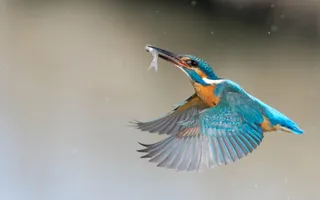Which birds are affected by avian flu?
Avian influenza, more commonly known as avian flu or bird flu, is the name of the virus that causes disease in birds. It occurs naturally among wild aquatic birds, like ducks, geese and swans, worldwide, and can also infect all domestic poultry and other bird and animal species.
What are the signs and symptoms of avian flu?
There are 2 types of avian influenza.
Highly pathogenic avian influenza (HPAI) is the more serious type. It is often fatal in birds. There are many clinical signs of HPAI, and these can vary between species. Some, like ducks and geese, may display minimal symptoms.
Low pathogenic avian influenza (LPAI) is usually less serious and may show more vague clinical signs. It can cause mild breathing problems and reduction of egg production, but affected birds may not always be obvious. The severity of LPAI depends on the type of bird and whether it has any other illnesses.
The Government has published some photos of clinical signs of avian influenza to help you identify symptoms.
Anyone who keeps poultry must keep a close watch on them for any signs of disease and seek prompt advice from their vet if they have any concerns.
What do I need to do if I suspect a bird has avian flu?
If you suspect any type of avian flu in poultry or captive birds you must report it immediately by calling the Defra Rural Services Helpline on 03000 200 301. In Wales, contact 0300 303 8268. Failure to do so is an offence.
If you find dead wild waterfowl (swans, geese or ducks) or other dead wild birds, such as gulls or birds of prey, you should report them to the Defra helpline on 03459 33 55 77. Do not touch or pick up any dead or visibly sick birds that you find.
For further information see government advice to the public.
Why is there an outbreak?
Avian flu is a natural occurring event and, as with human flu, the virus mutates over time. Every year during the winter months, migrating birds migrating into Britain reintroduce it, potentially infecting wild birds that they come into contact with. This can cause clusters of dead birds, especially waterfowl like ducks and geese, who are more likely to catch it via contaminated water.
The virus spreads from bird to bird by direct contact or through contaminated body fluids and faeces. It can also be spread by contaminated feed and water or by dirty vehicles, clothing and footwear.
Unfortunately, the winter of 2021 is already seeing more diagnosed cases in the UK than ever previously recorded, although there is no clear indication as to why.
What is being done to control the outbreak?
Government vets monitor unexplained bird deaths to trace and track incidents of bird flu and manage the UK's response.
As a result of the vast numbers of cases that are being recorded for 2021, an Avian Influenza Prevention Zone (AIPZ) came into force across Great Britain on the 3 November 2021, and in Northern Ireland on the 17 November 2021.
This was then extended to include housing measures across the UK on the 29 November 2021, which means that it is now a legal requirement for all bird keepers across the UK to keep them indoors and follow strict biosecurity measures to limit the spread of and eradicate the disease. This applies to all birds, whether they are pets, large commercial flocks or a small backyard flock.
The AIPZ requirements will be kept under regular review as part of the government's work to monitor and manage the risks of avian influenza. Any decisions on when to lift or amend the AIPZs will be based on risk assessments produced from the latest scientific and ornithological evidence and veterinary advice.
For further details see government guidance.
Is it a threat to humans?
The UK Health Security Agency (UKHSA) says that avian flu is primarily a disease of birds and the risk to the general public's health is very low. The NHS website states that in rare cases, some strains can affect humans, but none have ever done so in the UK.
Like any virus, avian flu changes and mutates frequently, creating new strains. This means that there is always a risk that a new strain could spread among people.
Avian influenza isn't an airborne virus. It cannot be passed through the likes of sneezes or coughs. But you could put yourself at risk of contracting avian flu by:
- touching infected birds
- touching droppings or bedding of infected birds
- killing or preparing infected poultry for cooking
- eating undercooked or raw poultry or duck, or raw eggs
Properly cooked poultry and poultry products, including eggs, are safe to eat.
For further information on symptoms and what to do if you think you have been infected, see NHS Guidance.
Is it linked to Covid-19?
Avian influenza is not linked to coronavirus (COVID-19).
What does the Trust do about it?
Our waterways attract migratory birds and also pass through many other habitats visited by them. Birds, particularly those that spend time on water, are at risk of catching avian flu and passing it on to local captive flocks. Dead birds on waterways may be one of the first signs that a new variant of avian flu has arrived in the UK.
With our regular presence on the waterways, our colleagues will often spot dead birds during an avian flu outbreak. They will also receive reports from members of the public. When we receive reports of dead wild waterfowl (e.g swans, geese or ducks) or other dead wild birds, such as gulls or birds of prey, we report them to the Defra helpline and follow their directions for next steps.
We also ensure our colleagues are kept safe by following the precautions outlined by DEFRA.






